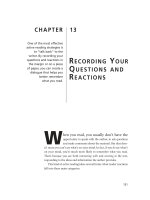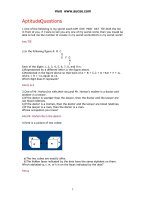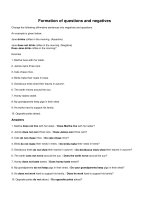Recording Your Questions and Reactions
Bạn đang xem bản rút gọn của tài liệu. Xem và tải ngay bản đầy đủ của tài liệu tại đây (85.88 KB, 10 trang )
131
CHAPTER
13
R
ECORDING
Y
OUR
Q
UESTIONS AND
R
EACTIONS
One of the most effective
active reading strategies is
to “talk back” to the
writer. By recording your
questions and reactions in
the margin or on a piece
of paper, you can create a
dialogue that helps you
better remember
what you read.
W
hen you read, you usually don’t have the
opportunity to speak with the author, to ask questions
and make comments about the material. But that does-
n’t mean you can’t say what’s on your mind. In fact, if you do say what’s
on your mind, you’re much more likely to remember what you read.
That’s because you are both interacting with and reacting to the text,
responding to the ideas and information the author provides.
This kind of active reading takes several forms. Most reader reactions
fall into these main categories:
READ BETTER
,
REMEMBER MORE
132
•
Asking questions
•
Agreeing and disagreeing
•
Making connections
•
Evaluating
ASKING QUESTIONS
You’ve already studied how to ask questions to help you anticipate what’s
ahead. The kinds of questions discussed here are questions you ask in
response to the ideas you read. Is there anything you don’t understand?
Something you want to know more about? Below is an example of how
this kind of questioning works. Read the following paragraph carefully
and notice the questions in the margin:
No-Smoking Policy
Instituting a no-smoking policy in the office would create
more problems than it would solve. First of all, employees
who smoke would be forced to leave the building in order to
smoke. That means they would have to take longer breaks,
and, as a result, they’d spend less time working. They’d also
have to take fewer breaks so that their breaks can be longer.
That means there’ll be longer stretches of time between
cigarette breaks. Consequently, these employees will be
more irritable. Furthermore, we risk losing employees who
are long-term smokers. These employees may very well
quit to find another company that will let them smoke
while they work.
Asking questions like these shows you’re thinking critically about
what you read. In addition, because you’re formulating questions in
response to the ideas in the text, you’re more likely to remember those
ideas. And asking questions encourages you to find the answers to those
questions.
AGREEING AND DISAGREEING
You’re also much more likely to remember what you read if you know
how you feel about the ideas a writer conveys. When a writer offers an
opinion, you don’t have to simply accept or reject it. You can—and
How many smokers
are there? ratio
of smokers vs.
non-smokers?
What prob-
lems would
it solve?
Could they
make a
smoking
lounge?
Could company
sponsor programs
to help smokers
quit?
RECORDING YOUR QUESTIONS AND REACTIONS
133
should—react to it. Do you agree or disagree with it? Do you think what
the writer said is brilliant, or malarkey? Why?
Here’s the no-smoking policy paragraph again, this time with a
reader’s reactions in the margins.
Instituting a no-smoking policy in the office would create
more problems than it would solve. First of all, employees
who smoke would be forced to leave the building in order to
smoke. That means they would have to take longer breaks,
and, as a result, they’d spend less time working. They’d also
have to take fewer breaks so that their breaks can be longer.
That means there’ll be longer stretches of time between ciga-
rette breaks. Consequently, these employees will be more irri-
table. Furthermore, we risk losing employees who are long-
term smokers. These employees may very well quit to find
another company that will let them smoke while they work.
Reacting to a writer’s ideas forces you to slow down a bit, and that’s a
good thing—you can focus on ideas longer and make sure you under-
stand them. In addition, reacting to ideas helps you make a connection
to your own feelings, which in turn helps lock the ideas in your memory.
After all, think of it this way: If you meet a bunch of people at a party,
who do you still remember a month later? You’re most likely to remem-
ber those people with whom you either agreed or disagreed passionately.
P
RACTICE
1
Read the following passage carefully and actively. As you read, record
your questions and reactions in the margins.
Imagine how wonderful it would be if you had a four-day
work week. Rather than working five eight-hour days (40
hours), you’d work four ten-hour days (still 40 hours). Then,
you’d have Friday, Saturday, and Sunday off. This would give
you a three-day weekend every week. The benefits of this
extra day would be numerous. You’d have a full day for
running errands that you can’t get done while you’re at work;
a day to clean while your kids are at school so that you could
I’d like to be
free of sec-
ond hand
smoke
might be
good for
them
Not necessarily
only if they’re
seriously addicted
or it just might help
“light” smokers quit
smoking
READ BETTER
,
REMEMBER MORE
134
have leisurely family weekends; one less day of child care
expenses you’d have to pay; an extra day for you to rest.
Psychologically, you would also benefit by feeling that there’s
almost a fair balance in your life between work (four days)
and rest (three days).
Answer
Imagine how wonderful it would be if you had a four-day work
week. Rather than working five eight-hour days (40 hours),
you’d work four ten-hour days (still 40 hours). Then, you’d
have Friday, Saturday, and Sunday off. This would give you a
three-day weekend every week. The benefits of this extra day
would be numerous. You’d have a full day for running errands
that you can’t get done while you’re at work; a day to clean
while your kids are at school so that you could have leisurely
family weekends; one less day of child care expenses you’d have
to pay; an extra day for you to rest. Psychologically, you would
also benefit by feeling that there’s almost a fair balance in your
life between work (four days) and rest (three days).
MAKING CONNECTIONS
You can also help yourself remember what you read by making connec-
tions. You can make connections between:
1
. Different ideas within the text
2
. The text and your own experience
this would be
great!
this is
important
what about
people who
already work
a 10-hour
day?
wouldn’t you
still have to
pay for at
least 40
hours of child
care?
RECORDING YOUR QUESTIONS AND REACTIONS
135
For example, look at how the reader makes connections as she reacts
to the passage below: Her “connections” are on the left, and her questions
are on the right.
ABC Chemical of Williamsburg, Ohio, is in hot water.
Local environmentalists discovered last week that the com-
pany’s plant has been leaking toxic chemicals into the town’s
water supply.
County records indicate that there has been a large increase
in stomach ailments and short-term memory loss in the area.
The company spokesperson, Mel Gerardi, insists that
ABC Chemical executives knew nothing of the leak.
According to Gerardi, the company passed the city’s
Environmental Commission inspection just last month.
How the leak went undetected, he says, is a mystery.
Local residents have threatened ABC Chemical with a
class-action suit for negligence.
A similar case is pending in Richdale, Arkansas, where a
pesticide company was found to have been emitting toxic
fumes into the neighborhood. For several weeks, residents
had complained of stomach pain and general nausea as well
as difficulty remembering things. The cause was eventually
traced back to the pesticide plant.
Making Connections to Remember More
Making connections between different ideas in the text will help you
remember those ideas. Reacting to an idea is like tying it down with one
string in your brain. But one string is easily broken. If you take notes, you
add another string, and it’s more likely you’ll remember that idea. If you
make a connection between that idea and another idea in the text, you
add another string. And if you make a connection between the text and
your own experience, you add yet another string. Every time you review
the material, you tie it down with yet another string, so that soon the
information is thoroughly anchored in your memory.
Making connections between the text and your own experience also
makes the ideas and information that you learn more practical and real.
Not
another
leak!
I’d sue
them too
Sounds
suspicious
to me
John lives
in Richdale
People in
both towns
had similar
sicknesses
How many
residents
have been
affected?
What toxins are
responsible?
How are companies
supposed to dispose
of them?
Could there be a
cover–up?
this is
mportant









